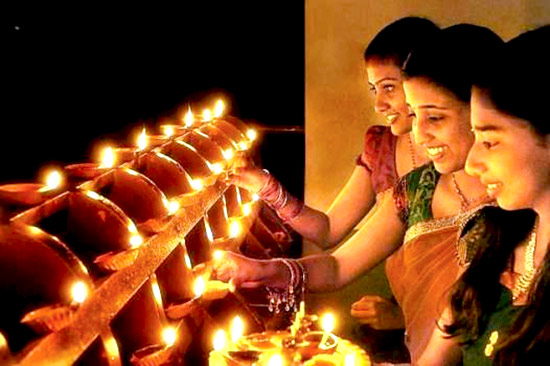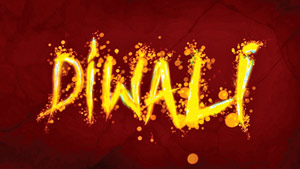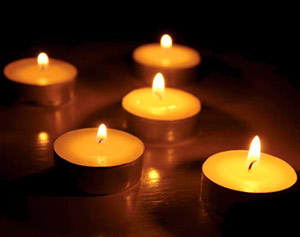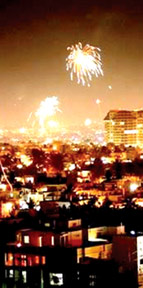Deepavali signifies the good over evil and renewal of life
By P. Krishnaswamy
Hindus of Sri Lanka, India and many countries where they live or
expatriates are celebrating Deepavali (literally “a row of lamps”) also
known as Diwali in many parts of India other than in Tamil Nadu, next
Wednesday.
|

Celebrating the Festival of Lights |
Perhaps it is the most important and ancient of the Hindu festivals.
It’s an official holiday in India, Nepal, Sri Lanka, Myanmar, Mauritius,
Guyana, Trinidad and Tobago, Suriname, Malaysia, Singapore and Fiji. It
is also known as “The Festival of Lights” and although it is not a
practice in Sri Lanka in many parts of India families light small oil
lamps (diyas) and candles around the home before setting off
firecrackers and fireworks.
|
Deepavali is a festival
which every Hindu longs for every year. The preparations for
Deepavali start long before the festival date. The Hindus in Sri
Lanka and Tamil Nadu rejoice on that day all family members
meeting in one place, paying respect to elders and sharing
moments of
delight and kinship.
 |
The people of the North and East would be celebrating the festival in
their own homes this time and in an atmosphere of peace and delight
after nearly three decades of uncertainty and turbulence.
For the children the major excitement on Deepavali Day is bursting
crackers. They light sparklers, rockets, ground chakkars and a variety
of other crackers.
Preparations
Deepavali is a festival which every Hindu longs for every year. The
preparations for Deepavali start long before the festival date. The
Hindus in Sri Lanka and Tamil Nadu rejoice on that day all family
members meeting in one place, paying respect to elders and sharing
moments of delight and kinship.
The festival begins with everyone bathing after applying gingerly oil
on the body, which called gangasnan, placing new clothes and sweetmeats
in front of lithographs of deities with lighted oil lamps also placed,
wearing the cloths, paying respect to the elders and getting their
blessings. Thereafter they go to the temple for worship, mostly to the
Maha Vishnu temple. Then they visit other relatives in close proximity.
 Deepavali is the brightest festival to be celebrated among Hindus.
The delicious food associated with the feast with family members and
relatives assembled in one place makes it memorable every year. Deepavali is the brightest festival to be celebrated among Hindus.
The delicious food associated with the feast with family members and
relatives assembled in one place makes it memorable every year.
Historically, the origin of Deepavali (or Diwali) can be traced to
ancient India, when it was probably an important harvest festival.
However, there are various legends pointing to the origin of ‘Deepavali.’
Some believe it to be the celebration of the marriage of Lakshmi with
Lord Vishnu.
In Bengal the festival is dedicated to the worship of Mother Kali,
the dark goddess of strength. Lord Ganesha, the elephant-headed God, the
symbol of auspiciousness and wisdom, is also worshiped in most Hindu
homes on this day. In Jainism Deepavali has an added significance to the
great event of Lord Mahavira attaining the eternal bliss of Nirvana.
Diwali also commemorates the return of Lord along with Sita and
Lakshman from his 14-year-long exile and vanquishing the demon-king
Ravana. In joyous celebration of the return of their king, the people of
Ayodhya, the Capital of Rama, illuminated the kingdom with earthen diyas
(oil lamps) and burst crackers.
Belief
  Another legendary belief is that it was to celebrate the day on which
Lord Krishna vanquished the vilest and formidable demon Naga Asura.
Another legendary says that it was on that day that Lord Vishnu, who in
his dwarf incarnation vanquished the tyrant Bali, and banished him to
hell. Another legendary belief is that it was to celebrate the day on which
Lord Krishna vanquished the vilest and formidable demon Naga Asura.
Another legendary says that it was on that day that Lord Vishnu, who in
his dwarf incarnation vanquished the tyrant Bali, and banished him to
hell.
Bali was allowed to return to earth once a year, to light millions of
lamps to dispel the darkness and ignorance, and spread the radiance of
love and wisdom. But generally, Deepavali signifies the triumph of light
over darkness, good over evil, and renewal of life.
In some parts people also start new ventures on this day after
performing Lakshmi Puja. This is marked by lighting lamps, candles and
diyas by the womenfolk in the family. The light and colour add to the
celebrations. But generally, it is the day to worship light and
dispelling darkness from the mind.
Deepavali is associated with wealth and prosperity in many ways.
Festival
In the Northern parts of India, the festival is celebrated for five
days, Usually the festival takes place at the new moon on the 15th day
of the Hindu month of Kartik or Karthika (October/November). This is at
the beginning of the winter season and is called the “darkest night of
the year”, so lamps are lit to brighten this moonless night.
Although a Hindu festival, Diwali is also celebrated by Sikhs and
Jains. |

